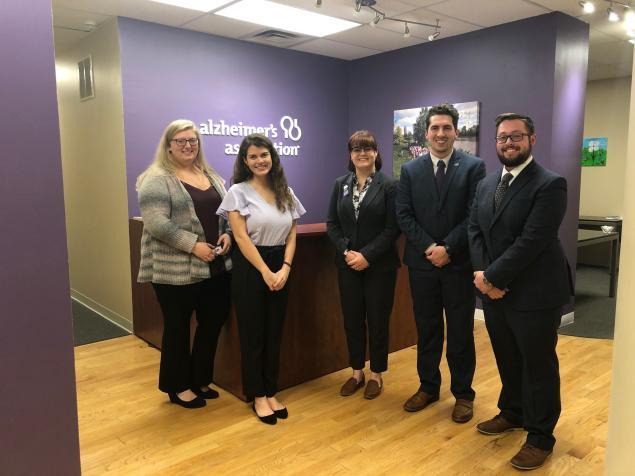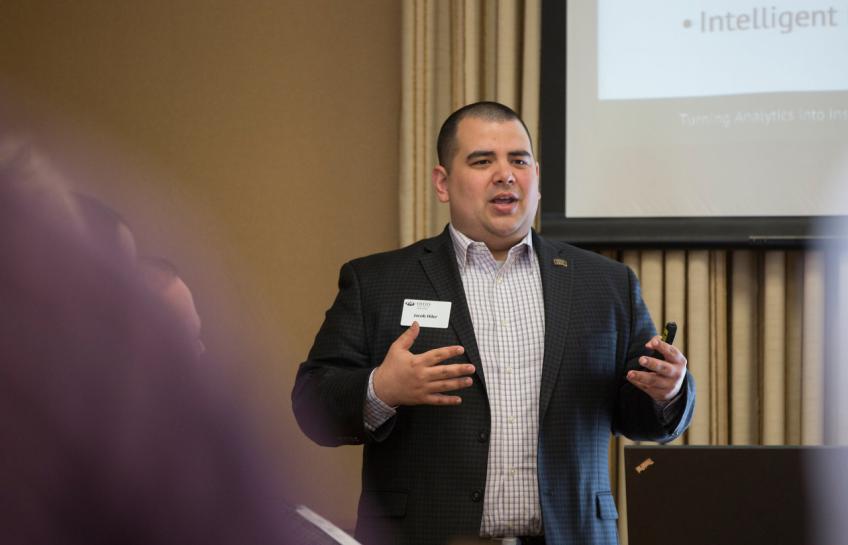Hiler and the CRA support nonprofit and local businesses with pro-bono marketing services
Dr. Jacob Hiler is the Fox Associate Professor of Marketing and the Director of the Center for Consumer Research and Analytics (CRA), in addition to be the President of the College of Business faculty. He started at OU as the Academic Director of the CRA in 2015 and was later promoted to the director of the center in 2018. According to its website, the mission of the CRA is “to provide students with learning opportunities and provide valuable research in consumer behavior analysis and research to corporate partners.”
“When I first started, the center was ten students and three faculty advisors,” Dr. Hiler says. “Now it’s grown to a center where at one point we had over 60 students and 10 faculty advisors as part of the center.”
Under Dr. Hiler’s leadership, the mission of the CRA has expanded to serve non-profit and local business partners, and Dr. Hiler prioritizes looking for opportunities to give back to the university and the community. The CRA operates like a small independent market research and analytics consultancy firm, and regularly takes on at least one project each semester from either a local, university community, or non-profit client. For all the projects involving small local businesses or non-profit companies, the work is done for free.
To date, this work has in included projects with organizations like the Alzheimer’s Association, Passion Works Studio, Donkey Coffee, and Frog Ranch Foods, and they are currently working with the Lupus Foundation. All of the organizations and businesses have different objectives that the CRA has helped them achieve. A lot of the work is built around answering the questions of how to increase engagement, charitable giving, and inform college students about conditions that they may not be familiar with if they haven’t been personally affected by them.
For example, in 2018 the CRA surveyed, interviewed, and ran taste-tests for Frog Ranch Foods. The students identified key drivers of salsa preferences and identified core opportunities to increase brand awareness in the Athens area. Due to the amount of brand awareness that the CRA drew to Frog Ranch, the company consistently sold out of products in Athens area stores.
To Dr. Hiler, community engagement is just about being a good member of society. He says, “Organizations and individuals should do what they can to help the people in their communities. If we truly want to make the world a better place, I believe that all starts with people focusing on improving the lives of people within their local community.”
When Dr. Hiler first started with the center, they were doing around 6 projects a year. This number has since increased to roughly 22 projects a year. Each group that works on a project is made up of a team of 4 to 5 students that is paired with a faculty advisor. The faculty advisors act as a sort of safety net and a mentor, which is why Hiler chose to pursue academia. The positive mentors in his life influenced him greatly, and he wanted to be able to give students this same experience.
“I was a pretty lost individual in my teens and early twenties. I didn’t know what direction my life was going, and I was angry about a lot of stuff. During High School I met Adrian Griffin, a manager at a local fitness store, and he took me under his wing… first to learn how to work out and get healthy, later he gave me a job delivering and repairing fitness equipment, and eventually he became the big brother I never had. He decided to mentor a kid that he barely knew and didn’t owe anything to. He just saw someone in need and decided to help, and in the end, I credit him with teaching me to be a better person and in many ways saving my life. Later on in college, I met Dr. Chris Manolis and he ended up playing just as significant a role in my life as Adrian. If Adrian saved my life, it was Chris who helped to give my life direction. Chris helped me find my passion for marketing, helped me obtain my first internship which turned into my career in marketing research, and eventually helped me get into a PhD program. That same kindness is something that I try to pass on to my students in honor of both Adrian and Chris’ memory,” he says.
Dr. Hiler’s experience with mentors got him to where he is now, and he uses the knowledge and lessons that he gained from them on a regular basis. Though market research and analytics are the skills that are focused on in the center, ultimately Dr. Hiler views the CRA as a vehicle for helping people find their place in the world and to mentor them to be kind and caring leaders. Dr. Hiler often thinks of the CRA in the context of a quote he learned while at the Williams College of Business at Xavier University which emphasizes that Dr. Hiler and his team are helping students become a “person for others.”
“To become someone who lives their life in service of other people. That’s what we try to instill in all our students. It’s fantastic that we’ve had so many students who have graduated with honors and got awesome jobs, but the thing that I’m most proud of are the people that our students have become. People who are caring, compassionate, and empathetic leaders,” he says. “That’s what I think makes the CRA experience so unique beyond the fact that there’s not really any other schools that offer students this invaluable experiential learning opportunity to conduct live-client market research and analytics projects to the degree that we do.”
In addition to working with a plethora of large companies, one of the things that is important to Dr. Hiler is the CRA looking for opportunities to give back to the university and the community. The CRA has made the commitment to take on at least one pro bono non-profit, university community, or local project each semester.

